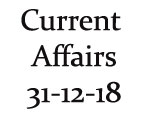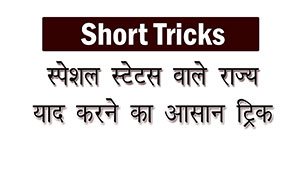-
Current Affairs 31st December 2018
Updated : 31-Dec-2018
Current Affairs 31st December 2018 - Important Points
- Submission of India's Second Biennial Update Report to UNFCCC approved by - Cabinet
- PM Modi's visit to Uttar Pradesh for One District, One Product Regional Summit organised for 6th International Rice Research Institute inauguration on - 29th December 2018
- The National Commission for Indian Systems of Medicine Bill, 2018 approved - Union Cabinet
- National Commission for Homeopathy Bill, 2018 gets - Cabinet sanction
Current Affairs 31st December 2018 - Details
Submission of India's Second Biennial Update Report to UNFCCC approved by - Cabinet
The submission of India's second Biennial Update Report (BUR) is approved by Prime Minister Narender Modi led Cabinet to the UNFCCC (United Nations Framework Convention on Climate Change ) towards the fulfilment of the reporting obligation under the Convention.
Important Features
- The second biennial update report is also trageting to give an update to India's first biennial report to the UN’s body on climate change.
- The report is containing five major components which include national circumstances, national greenhouse gas inventory,finance, technology,mitigation actions and capacity building needs and support received, domestic monitoring, verification and reporting arrangements.
- The report has been prepared based on a range of studies that are conducted at the national level. It has been taken to a multitier review process, through peer review, Technical Advisory Committee of Experts review chaired by Additional Secretary (Climate Change) and by National Steering Committee chaired by Secretary.
- They finalise biennial report after addressing all the relevant modifications and comments with respect to the multi-tier review process.
Report Findings
- A total of 26, 07,488 Gigagram (Gg) CC-2 equivalent of Green House Gases (GHG) were emitted from all activities (excluding LULUCF) in India in 2014.
- The net national GHG emissions after including LULUCF were 23, 06,295 Gg COa equivalent.
- Out of the total emissions, energy sector accounted for 73 percent, IPPU 8 per cent, agriculture 16 per cent and waste sector 3 percent.
- About 12 percent of the emissions were offset by carbon sink action of cropland,forestland and settlements.
- The submission of India's second BUR will be fulfilling the obligation of India to furnish information regarding Convention implementation, being a Party.
PM Modi's visit to Uttar Pradesh for One District, One Product Regional Summit organised for 6th International Rice Research Institute inauguration on - 29th December 2018
PM Narendra Modi on December 29th, 2018 visited Varanasi & Ghazipur, UP and laid the foundation stone of medical College in Ghazipur in the presence of CM Yogi Adityanath. He analysed the preparations for the Pravasi Bharatiya Divas.
6th International Rice Research Institute- The PM dedicated the 6th International Rice Research Institute- IRRI, South Asia Regional Centre to the country.
- The Institute is constructed at the campus of National Seed Research & Training Centre in Varanasi.
- It will work as a hub for rice research & training in South Asia including SAARC region. This 1st
- International Centre in the Eastern India is supposed to harness & sustain rice production in the region.
One District, One Product Regional Summit - The One District, One Product Regional Summit was organised at Deendayal Hastakala Sankul, Varanasi.
- “One District One Product” plan is focused at enhancing the skills of local people & up-surging the reach of the indigenous trades, crafts & products from small towns & small districts in the state.
- These crafts & products are handicrafts, food processing, engineering goods, carpets, readymade clothes & leather goods etc which not only earn foreign exchange but also deliver employment to the people.
Proposals for implementation of Mahila Police Volunteer Scheme sanctioned
The suggestion from the states of Andhra Pradesh, Gujarat, Mizoram, Chhattisgarh, Karnataka & MP for the implementation of Mahila Police Volunteer Scheme has been sanctioned by the union government.
Haryana was the 1st state to adopt the initiative of Mahila Police Volunteer at Karnal & Mahindergarh areas on a pilot basis under the Nirbhaya Fund during FY 2016-2017.
Mahila Police Volunteer Scheme- A Mahila Police Volunteer could be any female who is socially & voluntarily committed towards empowerment of females & girls, willing to raise her voice against gender-based violence & backing the police in forming a gender just society free from violence.
- A Mahila Police Volunteer should be at least 21 years of age & possess minimum 12th pass certificate.
- A Mahila Police Volunteer must be from the similar geographical area & conversant with the local dialects.
- No criminal records must have been instituted against her & she must not have been
convicted/imprisoned for the violation of any criminal law. - A Mahila Police Volunteer should not be a associate of any political party.
- The Mahila Police Volunteers in the States or Union Territories will act as a relation between police & community &help females in distress.
- There will be 1 Mahila Police Volunteer per Gram Panchayat and Mahila Police volunteers will directly report to the Circle Inspector in the Police Station.
- The Mahila Police volunteers are needed to mobilize the community to form Mahila &Shishu Rakshak Dals to work as community watch groups.
- The broad order of the Mahila Police Volunteer is to report occurrences of violence against females such as domestic violence, child marriage, dowry harassment & violence faced by females in public spaces.
The National Commission for Indian Systems of Medicine Bill, 2018 approved - Union Cabinet
The Union Cabinet has sanctioned the National Commission for Indian Systems of Medicine- NCIM Bill,
2018. The bill pursues to replace the present regulator, the Central Council for Indian Medicine.
Highlights of the Bill- The bill issues for the formation of a National Commission with four autonomous boards.
- The Board of Ayurveda would be answerable for supervision the overall education of Ayurveda.
- The Board of Unani, Siddha & Sowarigpa will be accountable for supervising the overall education of Unani, Siddha & Sowarigpa.
- The bill provides for 2 common boards, Board of Assessment & Rating and Board of Ethics & Registration.
- The Board of Assessment & Rating would be accountable to assess & grant approval to educational institutions of Indian systems of Medicine.
- The Board of Ethics & Registration of practitioners of Indian systems of medicine would uphold National Register & deal with ethical problems relating to practice under the NCIM.
- The bill also suggests a common entrance exam & an exit exam which all graduates will have to pass to get practicing licenses.
- The bill proposes a teacher’s suitability test to assess the standard of teachers prior to appointment & promotions.
National Commission for Homeopathy Bill, 2018 gets - Cabinet sanction
The Union Cabinet has sanctioned the National Commission for Homeopathy bill, 2018. The National
Commission for Homeopathy looks forward to replace the present regulator Central Council
of Homoeopathy.
Features of the Bill- Constitution of a national commission with 3 autonomous boards.
- The Homoeopathy Education Board to be vested with the accountability of supervising the Homeopathy education in the nation.
- The board of assessment & rating to assess and grant recognition to educational institutions of
Homoeopathy. - Board of ethics & registration of practitioners of Homoeopathy to maintain National Register and deal with ethical matters concerning practice.
- The bill also proposes a common entrance exam & an exit exam which all graduates will have to pass to get practicing licenses.
- The bill proposes a teacher’s eligibility test to evaluate the standard of teacher’s beforehand appointment & promotions.














